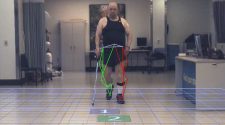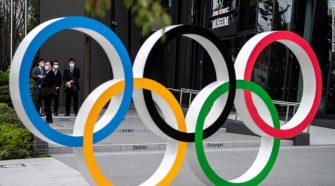A day later, it’s hard to stop thinking about this play:
It happened in the third quarter of the Ohio State-Clemson national semifinal, with the Buckeyes down 21-16, and the call on the field was that the Clemson receiver caught the ball, fumbled it, and Ohio State scored a touchdown after the recovery. It felt like a big moment at the time, but who knows if it would have affected the outcome; OSU re-took the lead later, lost it, and had a chance to win at the end. Still, it would have been a massive momentum swing when it happened.
But the call was overturned on instant replay, and the justification from the referees was that “the ball was becoming loose in his hands and he did not complete the process of the catch.” Which, having watched it about eight million times in the last day, seems provably (even laughably) wrong. I’m not going to pretend I know the rulebook inside and out, but people who do also believe that it was a catch followed by a football move, in which case it should have been a fumble. Even weirder, it’s supposed to be difficult to overturn the call on the field; the evidence is supposed to be definitive. I guess if the call had been an incomplete pass, it would make more sense, but the call was a fumble, the replay made it look like a fumble, and still, they changed their minds.
Why?
Well, the whys of that specific incident don’t matter as much as the larger issue: Replay often fails. Not as often as we think from a technical perspective since there’s a certain amount of bias in what we remember (the failures stick in our minds longer), but enough to be perplexing, and to call the whole institution into question just on the merits of accuracy.
RELATED: Even horse racing can’t escape our collective replay madness
And once you get beyond the technical aspects into the way replay is changing sports, the reality of it all gets worse. Sometimes, replay fails even when it succeeds. I’ve been following Liverpool all year, and when they played Wolverhampton in an EPL match Saturday, they conceded a goal that appeared to equalize the match at 1-1, but the VAR replay system caught an apparent offside. Look at the feet:
Hold that thought…earlier, when Liverpool went up 1-0, VAR allowed the goal after checking for a handball. The problem is, they checked the wrong person, and in fact the goal-scoring process began with an obvious violation:
With these two goals, we saw a standard replay system at its worst. First, with the Liverpool goal, a total failure to function as intended due to human error…despite the availability of hundreds of camera angles, they still managed to look at the wrong thing. Second, on the Wolves goal, a technically correct call that nobody liked in spirit—even Liverpool supporters like me—because it was a question of millimeters, and the fact that such things are legislated to such minute degrees goes against the flow of the match and the flow of sports in general. Sure, he was technically offside, but the juice is not worth the squeeze, and the persnickety nature of the call looked even worse after Liverpool’s blatant handball.
This is not new—it’s been going since the advent of VAR. It’s gotten to the point that major commentators are saying things like “we can’t go on like this,” and it doesn’t even feel dramatic. Nobody is pleased, and even when the system works, it’s perceived as a failure….because the truth is that despite what video can show us, it keeps bringing us further away from real justice.
It’s happening in basketball, too. On Christmas Day, the Lakers played the Clippers, and there was a critical moment late in the fourth quarter when Patrick Beverley knocked the ball out of Lebron’s hands, and instant replay gave the ball to the Clippers because it grazed LeBron’s fingertips on the way out of bounds:
Now, technically this was the “right” call. However, as Nick Wright and others pointed out, this would have been Lakers ball in the pre-replay era, and if you looked at any similar play from here into the future, slow-motion frame-by-frame replay would likely show that the ball went out off of the ballhandler, even though the defender slapped it out. So, should every call like that go to the defense from now on? Or does it make more sense to go by the prevailing logic of the sport, which is that when a defender knocks the ball out of someone’s hand, it’s off that defender? Listen to Wright’s argument on this specific situation, and why replay is failing basketball, starting at the 45-second mark of this video:
You might disagree, as Chris Broussard did and many others have, and say “the rules are the rules, it touched LeBron last.” I can’t say you’re wrong, but I can say that it’s started a debate that has only hindered our understanding of the actual rules. Just as we no longer understand what constitutes a catch in football, a simple ball slapped out of bounds in hoops is now a matter of intense argument and perspective.
The problems don’t stop with the technicalities. The biggest story that came out in baseball last week concerned the potential use of a computerized strike zone, i.e. robot umpires. The human umps agreed to this as part of a bargaining process, as Jon Heyman reported:
If you’ve ever suffered through Joe West attempting to call balls and strikes, this may seem like a good idea, but it’s actually a travesty in the making. First off, like VAR and college football replay, it will almost certainly have glitches. Even if it ends up functioning well, and is superior in accuracy to the current system, it will remove human agency from the sport in a few ways. First, and most obviously, it will be anti-labor in the way it eliminates the biggest job on the field. Second, it will remove the dynamic of pitchers working corners, adjusting to strike zones, and of catchers framing pitches and batters adapting to new circumstances. All of these are critical skills currently, but they’ll become antiquated overnight. Third, it will be impossible to protest a bad call…who are you going to yell at when you don’t like a call, some computer stored in a database? That may seem like a poor reason to oppose a theoretically accurate system, but it’s going to erase some of the humanity from the game when the ultimate authority on such matters isn’t human.
I’m not someone who romanticizes bad calls, and in fact, I would hate to know the number of hours I’ve spent complaining about the incompetence of various referees and umpires and officials and even ruling bodies like the NCAA. That said, when you look at the consequences of ubiquitous replay, it boils down to a whole slew of negatives, all of which were exemplified just in the last week:
1. Wasted time
2. Continued inaccuracy when inconclusive footage is left to interpretation
3. Absolutely no movement toward greater justice
4. Selective enforcement—golfers, for instance, are now more frequently penalized if they happen to be on TV (see Tiger at the 2013 Masters)
5. A further complication of the rules, rather than increased clarity
6. The removal of human agency in sports
The deeper we get into the 21st century, the more we understand how the advance of technology has actually hindered us a species even as it promised a societal revolution. It’s no different in sports—the action in our professional leagues is covered digitally from every angle, facilitating an obsessive use of replay, and in almost every way imaginable it has made sports worst to watch, to play, and to officiate. If the choice before us is between the ugly reign of cameras and bad calls by an imperfect human, any sane fan would take human error in a heartbeat.















